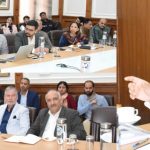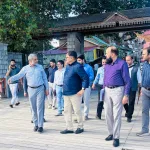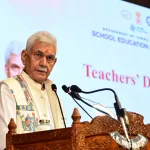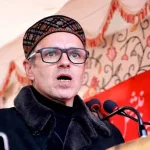He expressed optimism about the institution’s future, stating that it would “rise higher than where it stands today” under the leadership of the incoming team.
Kumar emphasised the pivotal role of voters and political parties in strengthening India’s democracy and extended his best wishes to all voters.
Speaking to ANI, Rajiv Kumar said, “This building is the place of worship of democracy. Through great hard work, it has amassed heritage in the last 75 years. I am very hopeful that in the time to come, this will rise higher than where it stands today. This is going to very capable hands. The new team will take it even higher.”
“The country’s democracy will remain strong and intact and will earn honour before the world. I hope that people will remember and learn lessons from Indian democracy and Indian elections. The biggest contribution towards this is by the voters and political parties. I wish all the best to everyone, all voters,” he said.
Meanwhile, Election Commissioner Gyanesh Kumar will take charge as the new Chief Election Commissioner of India tomorrow, February 19, 2025.
The Election Commission of India (ECI) on Monday bid farewell to the Chief Election Commissioner (CEC) of India, Rajiv Kumar, who will be demitting the office on February 18.
According to the statement released by the Commission, Kumar joined the ECI as Election Commissioner on September 1, 2020, and assumed charge as the 25th CEC of India on May 15, 2022.
His tenure spanning 4.5 years in the Commission was characterised by silent yet deep-rooted reforms across various domains spanning structural, technological, capacity development, communication, international cooperation and administration.
Kumar, during his tenure, had completed one full electoral cycle with the conduct of elections in 31 states and Union Territory, the Presidential and Vice Presidential elections in 2022, Lok Sabha elections of 2024 and Rajya Sabha renewals–a rare and monumental feat in electoral management. The elections were conducted peacefully with near-zero repolls and incidents of violence, the Commission stated.
In his farewell address, CEC Kumar thanked the 15 million polling officials for their dedication to upholding democratic values. He asserted that the trust of close to nearly a billion voters was unfazed by motivated and uncorroborated attacks on India’s democratic institutions.
As a proponent of technology, Kumar outlined a path for strengthening the conduct of elections while guarding against the threats of cyber-attacks and misinformation on social media. He lauded the voters for their vibrant participation, especially women voters and said that the electoral process is marching towards more inclusivity.
He also called for biometric authentication at polling booths to efficiently tackle impersonation and said that online reporting of political party expenditures has begun and must be made mandatory for better financial transparency and analytics.
He also stated that unregulated social media algorithms pose a serious risk to elections worldwide and must be addressed urgently.
Kumar further added that India’s expertise in electoral management is one of the biggest soft power of the country.
The Election Commissioners, Gyanesh Kumar and Sukhbir Singh Sandhu conveyed their appreciation for the inclusive, transformative and purpose-driven leadership of Kumar.
CEC Kumar’s tenure was marked by a slew of electoral reforms, including operationalising four qualifying dates for voter registration with an advanced application facility for 17+ youngsters; simplified forms for voter registration; redefining electoral boundaries with delimitation in Assam; and ensuring voting by polling personnel at the Voter Facilitation Centre to avoid any intimidation, delays and wrong-doing. These initiatives were aimed at empowering every eligible citizen while modernising election administration.
According to the Commission, Kumar also championed technology-driven electoral reforms to enhance efficiency, transparency, and accessibility. Under his leadership, ERONET 2.0, managing the largest electoral databases, strengthened voter roll management with multi-layered security, and seamless, and real-time application processing.
Kumar also established mechanisms to tackle the challenge of misinformation and fake news on social media platforms with the launch of the ‘myth vs reality’ register during the Lok Sabha Elections 2024.
Kumar’s contributions were both systemic and profoundly human. His hands-on leadership was evident in his actions. On the global stage, his efforts amplified India’s voice in advancing democratic values, with the Election Commission spearheading ‘Cohort on Election Integrity’ and training officials from many election management bodies. (ANI)
CEC Rajiv Kumar bids farewell to ECI, describes it as ‘place of worship of democracy’
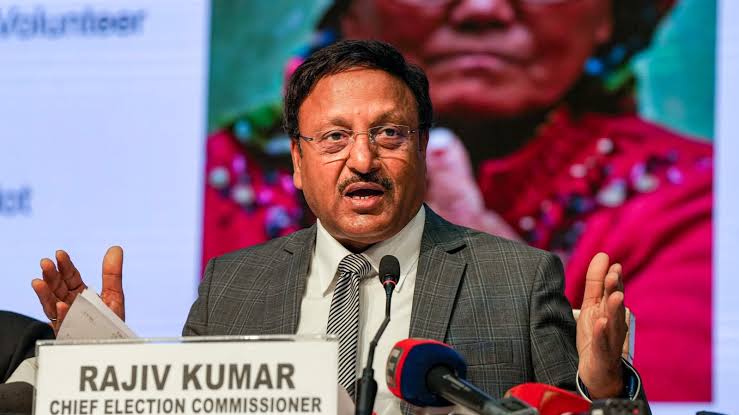
Leave a Comment Leave a Comment



